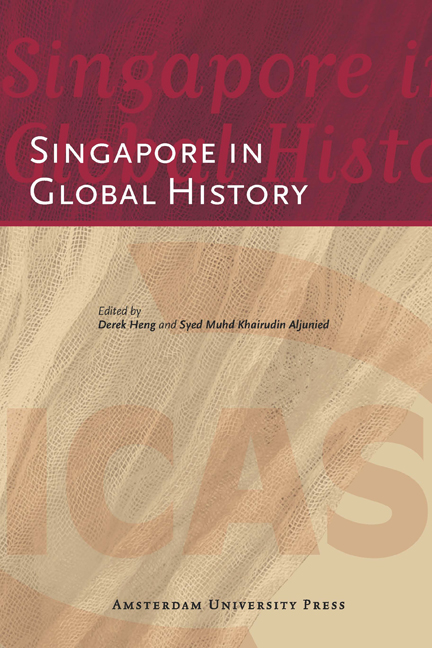Book contents
- Frontmatter
- Contents
- List of Tables and Illustrations
- Foreword
- 1 Globalising the History of Singapore
- 2 Situating Temasik within the Larger Regional Context: Maritime Asia and Malay State Formation in the Pre-Modern Era
- 3 The Singapore River/Port in a Global Context
- 4 ‘Walls of Illusion’: Information Generation in Colonial Singapore and the Reporting of the Mahdi-Rebellion in Sudan, 1887-1890
- 5 The Littoral and the Literary: Making Moral Communities in the Straits Settlements and the Gold Coast in the late Nineteenth and Early Twentieth Century
- 6 Social Discourse and Economic Functions: The Singapore Chinese in Japan’s Southward Expansion between 1914 and 1941
- 7 The Dynamics of Trans-Regional Business and National Politics: The Impact of Events in China on Fujian-Singapore Tea Trading Networks, 1920-1960
- 8 Rambutans in the Picture: Han Wai Toon and the Articulation of Space by the Overseas Chinese in Singapore
- 9 The Global Effects of an Ethnic Riot: Singapore, 1950-1954
- 10 The British Military Withdrawal from Singapore and the Anatomy of a Catalyst
- 11 Bringing the International and Transnational back in: Singapore, Decolonisation, and the Cold War
- 12 The Global and the Regional in Lee Kuan Yew’s Strategic Thought: The Early Cold War Years
- 13 A Brief History of the Hub: Navigating between ‘Global’ and ‘Asian’ in Singapore’s Knowledge Economy Discourse
- About the Contributors
- Bibliography
- Miscellaneous Endmatter
5 - The Littoral and the Literary: Making Moral Communities in the Straits Settlements and the Gold Coast in the late Nineteenth and Early Twentieth Century
Published online by Cambridge University Press: 02 February 2021
- Frontmatter
- Contents
- List of Tables and Illustrations
- Foreword
- 1 Globalising the History of Singapore
- 2 Situating Temasik within the Larger Regional Context: Maritime Asia and Malay State Formation in the Pre-Modern Era
- 3 The Singapore River/Port in a Global Context
- 4 ‘Walls of Illusion’: Information Generation in Colonial Singapore and the Reporting of the Mahdi-Rebellion in Sudan, 1887-1890
- 5 The Littoral and the Literary: Making Moral Communities in the Straits Settlements and the Gold Coast in the late Nineteenth and Early Twentieth Century
- 6 Social Discourse and Economic Functions: The Singapore Chinese in Japan’s Southward Expansion between 1914 and 1941
- 7 The Dynamics of Trans-Regional Business and National Politics: The Impact of Events in China on Fujian-Singapore Tea Trading Networks, 1920-1960
- 8 Rambutans in the Picture: Han Wai Toon and the Articulation of Space by the Overseas Chinese in Singapore
- 9 The Global Effects of an Ethnic Riot: Singapore, 1950-1954
- 10 The British Military Withdrawal from Singapore and the Anatomy of a Catalyst
- 11 Bringing the International and Transnational back in: Singapore, Decolonisation, and the Cold War
- 12 The Global and the Regional in Lee Kuan Yew’s Strategic Thought: The Early Cold War Years
- 13 A Brief History of the Hub: Navigating between ‘Global’ and ‘Asian’ in Singapore’s Knowledge Economy Discourse
- About the Contributors
- Bibliography
- Miscellaneous Endmatter
Summary
In late 2009, I returned to Singapore after several months abroad. Eager to catch up on the popular history I had missed, I started browsing in the relevant section of Borders on Orchard Road. I picked up, not without some effort, the weighty 800-page Men in White: The Untold Story of Singapore's People's Action Party. Opening the first few pages, I scanned its table of contents. The name of a single politician, understandably, was prominently featured early on in the story, yet he kept returning and returning, almost two decades after he stepped down as prime minister of Singapore. “Can PAP,” the book's authors wondered even in their last chapter, “survive LKY?” (Yap, Lim and Leong 2009: 641).
Historians in Singapore over the last two decades have, of course, worked to problematise the identification of a national history with a single life. Kevin Tan's and Lam Peng Er's Lee's Lieutenants (1999) was an early attempt to tell the stories about other prominent politicians in Singapore's governing party since independence; much recent work in both history and memoir has concentrated on the period of decolonisation from the late 1940s to 1965 and told the story of political actors who have often been excluded from – or misrepresented in – the national narrative. Further studies have questioned the building blocks that serve as a foundation for national story-telling: the division between the ‘Chinese-educated’ and ‘English educated,’ for instance, or between ‘Communist’ and patriotic nationalist. Taking a longer perspective, Kwa Chong Guan and others have placed Singapore's colonial and post-independence history within a much longer narrative of the island's situation as a node in networks of trade. According to this view, Singapore's history is cyclical, rather than linear, intimately connected to the region in which it is located, and a product of negotiation between communities rather than the fiat of colonial governors or post-independence prime ministers.
Yet, for all such historical revisionism, popular history in Singapore often defaults to a focus on Stamford Raffles and Lee Kuan Yew as representative figures in a developmental narrative. In this paper, I want to trace the roots of what we might call a popular national imaginary in Singapore.
- Type
- Chapter
- Information
- Singapore in Global History , pp. 89 - 110Publisher: Amsterdam University PressPrint publication year: 2012



